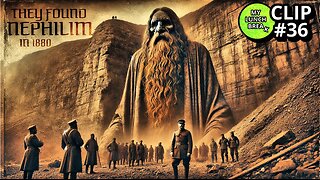Premium Only Content

Right to travel - 8 U.S.C § 1101(30)
#Knowledgemakesmenunfit2beAslave
TOLERATION. In some. countries, where religion is established by law, certain sects who do not agree with the established religion are nevertheless permitted to exist, and this permission is called toleration. Those are permitted and allowed to remain rather as a matter of favor than a matter of right.
2. In the United States, there is no such a thing as toleration, all men have an equal right to worship God according to the dictates of their own consciences. See Christianity; Conscience; Religious test.
Frame of Government
William Penn, 1682
In 1681 King Charles II of England granted William Penn a large tract of land on the west bank of the Delaware River, which Penn named Pennsylvania in honor of his father. Penn, a member and intellectual leader of the Quakers (Society of Friends), saw Pennsylvania as a refuge for Quakers and other persecuted peoples.
Penn believed in religious toleration on both pragmatic and moral grounds. He thought that a harmonious society, unhampered by intolerance, would be a prosperous society as well. In 1682, before he left England to become the first governor of Pennsylvania, Penn wrote the Frame of Government, which served as the colony's first constitution.
The Frame of Government was an expression of Penn's religious and political ideas. He sought to create a framework that would frustrate political mischief and prevent a ruler from assuming absolute power to the detriment of the community. To prevent absolutism, Penn employed the concept of balancing forces, a concept that the Framers of the U.S. Constitution later would use liberally. Freedom of worship was to be absolute, and all the traditional English rights were to be protected.
In practice, the government outlined in the Frame of Government proved in some respects to be unworkable. Penn, however, had included an amending clause, the first in any written constitution, so that the Frame of Government could be changed as circumstances required.
God having made man such a creature, that in his own judgment it was not good for him to be alone, put him under strong obligations of necessity, convenience, and inclination, to drive him into society, as well as fitted him with understanding and language to continue and enjoy it. The first society was between man and wife, which gave beginning to that between parents and children; to which, in time, that between master and servant came to be added: and though all these might, and commonly did meet together, and make up but one family, wherein the master or mistress of it had some sort of rule proper to a family; each of these, or all together, came short of political society, as we shall see, if we consider the different ends, ties, and bounds of each of these.
-
 LIVE
LIVE
Akademiks
2 hours agoDay 1/30. KANYE WEST GOIN CRAZY
4,650 watching -
 LIVE
LIVE
Dad Dojo Podcast
11 hours agoEP24: Defending Your Kid: How Far Is Too Far?
86 watching -
 LIVE
LIVE
Bannons War Room
1 month agoWarRoom Live
24,057 watching -
 LIVE
LIVE
MYLUNCHBREAK CHANNEL PAGE
22 hours agoNephilim Were Found in 1880?
924 watching -
 53:13
53:13
BonginoReport
5 hours agoJFK Files Drop (Ep.163) - 03/19/2025
111K211 -

Matt Kohrs
13 hours agoMarket Open: Fed Interest Rate Decision Day || The MK Show
43.3K2 -
 1:12:15
1:12:15
Dear America
10 hours agoSHOCKING JFK Files Revelations + Harry Sisson In Trouble & Elon Saves Stranded Astronauts!
64.2K12 -
 46:12
46:12
Randi Hipper
1 hour agoBREAKING BITCOIN NEWS!
8.55K -
 LIVE
LIVE
Wendy Bell Radio
6 hours agoWELCOME HOME
9,319 watching -
 16:10
16:10
T-SPLY
4 hours agoElon Musk Is Still Being Attacked After Saving Stranded Astronauts
42.1K18